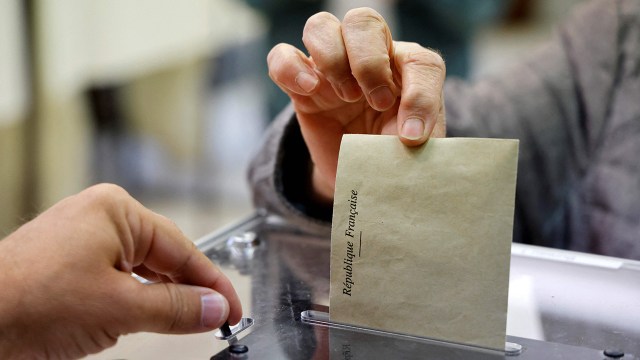
This Pew Research Center analysis focuses on public opinion of what it takes to be a good member of society in 19 advanced economies in North America, Europe, the Middle East and the Asia-Pacific region.
For non-U.S. data, this report draws on nationally representative surveys of 20,944 adults from Feb. 14 to June 3, 2022. All surveys were conducted over the phone with adults in Canada, Belgium, France, Germany, Greece, Italy, the Netherlands, Spain, Sweden, the United Kingdom, Australia, Japan, Malaysia, Singapore and South Korea. Surveys were conducted face to face in Hungary, Poland and Israel.
In the United States, we surveyed 3,581 U.S. adults from March 21 to 27, 2022. Everyone who took part in this survey is a member of the Center’s American Trends Panel (ATP), an online survey panel that is recruited through national, random sampling of residential addresses. This way nearly all U.S. adults have a chance of selection. The survey is weighted to be representative of the U.S. adult population by gender, race, ethnicity, partisan affiliation, education and other categories. Read more about the ATP’s methodology.
Here are the questions used for the report, along with responses, and the survey methodology.
Voting is a fundamental act in a representative democracy, and as a new survey of 19 advanced economies highlights, most people believe that to be a good member of society, you must vote. When asked whether seven different actions and behaviors are important to being a good member of society, respondents put voting at the top of the list. Across the nations polled, a median of 91% say voting is important, and fully 73% consider it very important. The share of the public saying it is very important ranges from 52% in Poland to 90% in Sweden.
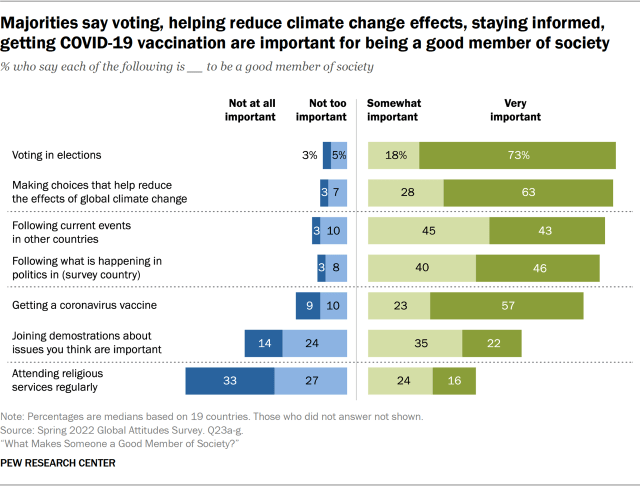
However, voting is not the only element of perceived good citizenship. Taking steps to improve the environment and promote public health are also seen as imperative: Solid majorities describe making choices to reduce global climate change and getting a coronavirus vaccine as very important.
Respondents also clearly believe that a responsible citizen needs to be informed about current affairs. Medians of more than eight-in-ten say it is important to follow current events in other countries and keep up with politics in their own country (however, fewer than half think it’s very important to follow international and domestic news).
Most also believe a good member of society should be willing to take to the streets when significant issues are at stake: A median of 57% say it’s important to join demonstrations about issues you think are important. Still, only 22% consider protesting very important, and Spain is the only country surveyed where more than half (54%) express this view.
Fewer see attendance at religious services as central to good citizenship. Across the nations polled, a median of just 41% say it’s important, and only 16% consider it very important. There are, however, notable cross-national differences on this question. While only single digits say attending religious services is very important in Australia (7%), Sweden (6%) and Japan (4%), a majority of Malaysians (55%) express this view, as do nearly three-in ten Singaporeans (29%) and a quarter of Israelis.
In the United States, 22% believe attending religious services is very important to being a good member of society. Among White Evangelicals, roughly half (49%) say this. On the other items tested, Americans are somewhat less likely than other publics to consider these actions crucial for good citizenship. For instance, only 22% of Americans say it is very important to follow current events in other countries – the second lowest percentage among the countries surveyed (Israel has the lowest share at 15%).
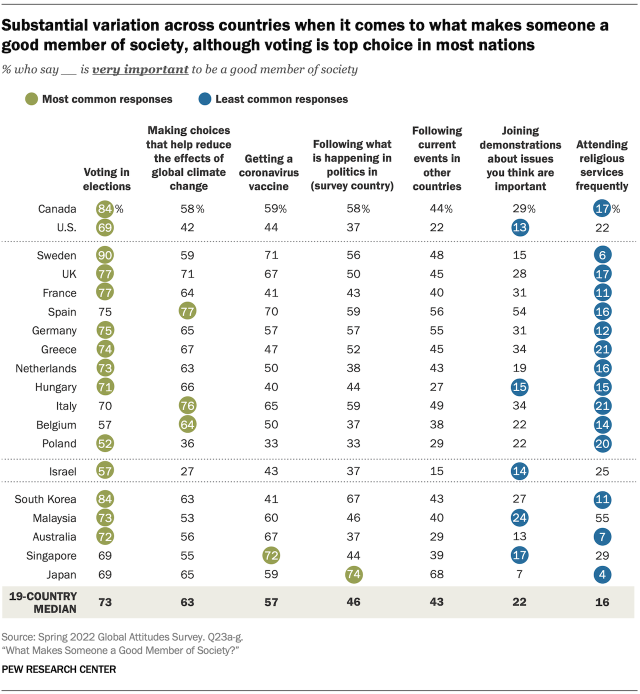
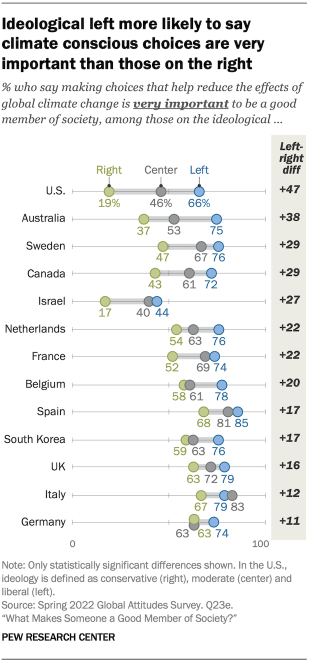
In addition to differences across countries, opinions often divide sharply between groups within nations. For instance, there are significant ideological differences in many countries over the importance of taking steps to combat global climate change, with those on the ideological left more likely to say it is very important for being a good member of society than those on the ideological right. This is especially true in the U.S., where 66% of self-identified liberals believe making choices to reduce the effects of climate change is very important for being a good member of society, compared with just 19% of conservatives.
In many nations, those on the left are also more likely than those on the right to place value on participating in demonstrations. However, people on the right of the political spectrum tend to see more value in attending religious services.
Age is also a major dividing line in some countries. Overall, older people are more likely to believe a good member of society should vote, get a COVID-19 vaccine and follow domestic and international news. However, young adults are more likely in a handful of countries to say protesting is a very important part of good citizenship.
In nearly all countries, women are more likely than men to consider making choices to reduce the effects of climate change very important for being a good member of society. For example, 71% of Swedish women hold this view, compared with 49% of Swedish men. (Past research has found that women are also more likely to say climate change is a major threat.)
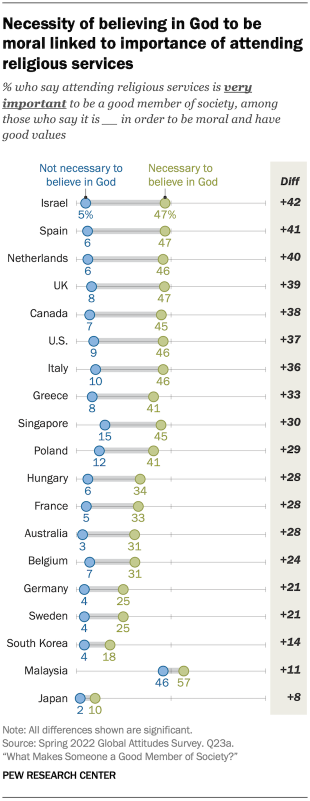
Views about attending religious services are closely tied to personal religiosity and attitudes toward religion and morality. In every country surveyed, people who think it is necessary to believe in God to be moral and have good values are significantly more likely to say attending religious services is very important to being a good member of society.
Still, even among people who see a clear link between religious belief and morality, there is no consensus about the role of religious attendance in civic life. Among the nations surveyed, Malaysia is the only one in which a majority of respondents who say it is necessary to be believe in God to be moral also say attending religious services is very important.
The nations in this survey, according to the World Bank, are largely high-income countries (Malaysia, which is upper middle-income, is the exception), and past Pew Research Center surveys have found that personal levels of religiosity are often higher in middle- and lower-income nations, so attitudes about the importance of religion in civic life may be different among those publics.
These are among the main findings of a Pew Research Center survey, conducted from Feb. 14 to June 3, 2022, among 24,525 adults in 19 nations.
Most people see voting as an important part of being a good citizen
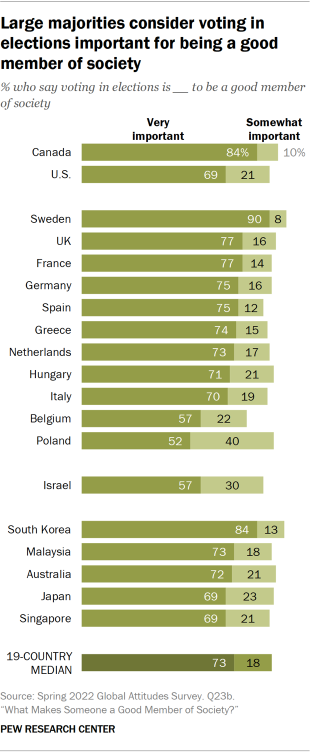
Large majorities in every country surveyed think it’s at least somewhat important to vote in elections to be a good member of society. In fact, in most places, around seven-in-ten or more say it’s very important to vote in elections to be a good member of society – though the share who say this is particularly high in Sweden, Canada and South Korea. (Notably, some countries do have some element of mandatory voting – whether enforced or unenforced. But places like Australia, where voting is mandatory, do not stand out in terms of the importance they place on it for being a good member of society.)
While around half or more still say voting is very important in Poland, Belgium and Israel, these three societies stand out for having the lowest share with this view. In Poland, the most recent presidential election in 2020 was both very close and, according to the opposition, marred by political interference and ultimately validated by a supreme court, which international observers no longer consider independent. In Belgium, recent elections have rarely resulted in a coalition in a timely way: Since 2010, the country has had two periods, each lasting more than 500 days, where no government has been able to be formed. Israel, for its part, had four elections between April 2019 and March 2021 because of difficulties forming a stable coalition – and, since the end of fieldwork, the fragile coalition collapsed, leading to a fifth election in four years.
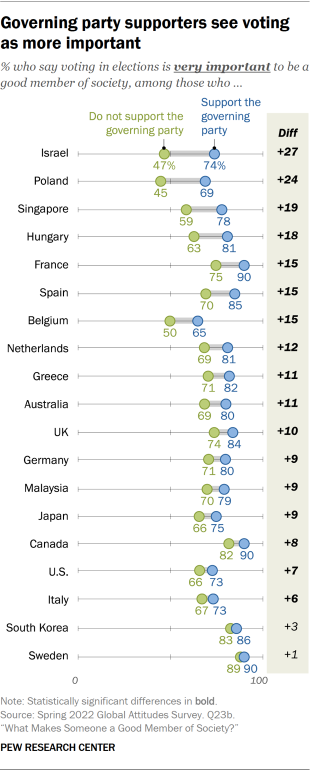
In nearly every country surveyed, people who support the governing party or parties are much more likely to say it’s very important to vote to be a good citizen than those who do not support the ruling party or coalition (for more, see Appendix A). The differences are particularly large in Poland and Israel, where voting is seen to be less important to be an upstanding member of society. For example, in Poland, 69% of those who identify with the right-wing populist ruling Law and Justice Party (PiS) say voting is very important, while only 45% of those who do not support PiS agree.
Supporters of the ruling Fidesz in Hungary, a right-wing populist party, are also more likely to see voting as very important but, outside of Poland and Hungary, people who identify with right-wing populist parties are sometimes less likely to see casting a ballot as crucial (for more, see Appendix B). In Germany, for example, 60% of those with a favorable view of Alternative for Germany (AfD) think voting is very important, compared with 79% of those who do not have a favorable view of the party.
People who think their political system affords them a great deal or a fair amount of influence on politics also tend to be more likely to say voting is essential to be a good citizen than those who think they have little or no ability to influence politics. In France, for example, 84% of those who think they have political efficacy describe voting as very important, compared with 75% who say they cannot impact their government much.
In most countries, those who are satisfied with democracy in their country are also more likely to say that voting is very important. For example, in the Netherlands, 81% of those who are content with how democracy is working in their country say voting is very important to be a good member of society, compared with 58% of those who are dissatisfied with democracy.
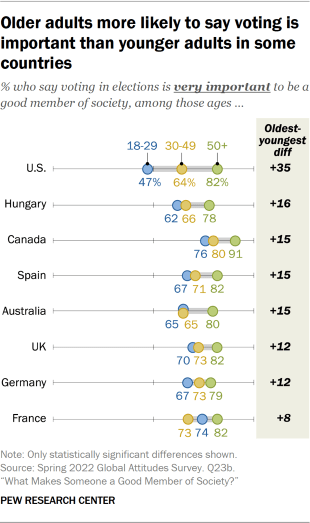
In some countries surveyed, older people are more likely than younger ones to say it’s very important to vote in order to be a good citizen. The gap is largest in the U.S., where 82% of those ages 50 and older say this, compared with 64% of those 30 to 49 and 47% of adults under 30. These age gaps in the importance of voting are consistent with overall patterns on turnout, as younger people are significantly less likely to report voting across countries tracked by the Organization for Economic Cooperation and Development than older ones.
People with higher levels of education are also more likely to see voting as important for being a good member of society in about half of the countries surveyed. In the Netherlands, for example, 80% of those with at least a postsecondary degree say voting is very important, compared with 67% of those with less schooling. Women, too, are somewhat more likely to say voting is imperative than men in some countries surveyed.
In the U.S., where we have a validated measure of whether someone actually did vote based on voter file information, results of a separate analysis indicate that most people who say voting is very important to be a good member of society did vote in the last presidential election (79%). Among those who say voting is just somewhat important, only about four-in-ten voted and just three-in-ten turned out at the polls among those who think voting is either not very or not at all important. For more, see “Most Americans say it’s very important to vote to be a good member of society.”
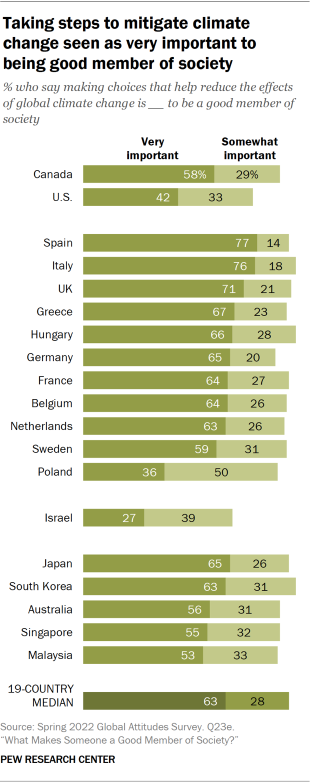
Reducing the effects of climate change important to many, especially those on the left
Roughly two-thirds or more of adults in each country surveyed say making choices that help reduce the effects of global climate change is at least somewhat important to be a good member of society – and in most of these places, a majority say it is very important. People in Spain, Italy and the United Kingdom are especially likely to say helping reduce the effects of climate change is very important to be a good member of society. However, Israelis and Americans stand out for their shares who say this focus on climate is not too or not at all important (32% and 24%, respectively).
Respondents who see climate change as a major threat are more likely to say climate conscious decisions are very important to be a good member of society. In Australia – where climate change is seen as a major threat more than all other global issues asked about – 74% of those who think climate change is a major threat say making choices to limit climate change is very important, compared with just 1% of those who say climate change is not a threat.
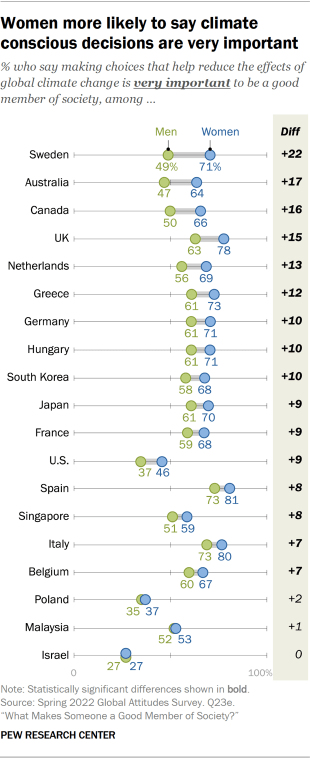
In about two-thirds of the countries surveyed, those on the ideological left are more likely to believe making choices that help reduce the effects of climate change is very important to be considered a good citizen. This difference is largest in the U.S., where roughly two-thirds (66%) of liberals call climate-related decisions very important compared with 19% of conservatives.
Women also place more value on taking steps to reduce climate change than men in 16 of the surveyed countries. Double-digit differences between sexes exist in Sweden, Australia, Canada, the UK, the Netherlands, Greece, Germany, Hungary and South Korea.
COVID-19 vaccination is widely seen as important to being a good member of society
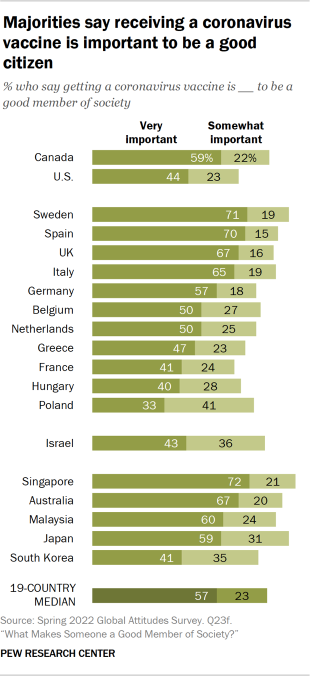
A large majority in every country surveyed say that it’s at least somewhat important to get a coronavirus vaccine to be a good member of society. Still, the share that describes it as very important varies substantially across the 19 countries surveyed, from around seven-in-ten who feel this way in Singapore, Sweden and Spain to around four-in-ten or fewer in France, South Korea, Hungary and Poland.
In almost every country surveyed, age is closely related to opinion about the importance of vaccination, with those ages 50 and older being much more likely to say it’s very important for being a good member of society than younger people. In the Netherlands, for example, 70% of adults ages 50 and older see vaccination as imperative, whereas only around a third of those 30 to 49 (30%) and those under 30 (32%) say the same. Outside of the Netherlands, the gap in views between old and young adults is at least 30 percentage points in South Korea (+35), France (+32), Canada (+31) and Belgium (+30), but is in the double digits in almost every place surveyed.
Partisan preferences also play a strong role in whether people think vaccination is crucial to be good members of society. In every nation, those who support the party or parties who are currently governing are much more likely to say it is very important to be vaccinated than those who do not support the ruling parties. This difference is largest in the U.S., where 64% of Democrats and Democratic-leaning independents think vaccines are very important, compared with 20% of Republicans and Republican-leaning independents.
There are also large ideological differences in nearly every country where left-right ideology is asked. In the U.S., South Korea, Canada, Italy, Israel and Spain, those who place themselves on the left are more likely to call vaccination very important for being a good citizen than those on the right; however, the opposite is true in Hungary, Poland and France. In the U.S., again, the differences between people on either side of the ideological spectrum is greater than in any other country surveyed (46 percentage points).
In some cases, right-wing populist party supporters are less likely than nonsupporters to say it is very important to get a vaccine. For instance, only 24% of Germans with a favorable view of Alternative for Germany (AfD) say vaccination is very important, while 64% of those with an unfavorable view say getting a vaccine is very important. For more information on European populist parties, see Appendix B.
Across the 19 countries surveyed, there is also a positive relationship between the share of the public who think it’s very important to get a vaccine to be a good member of society and the actual population that was fully or partially vaccinated at the time that fieldwork began (correlation of 0.64). (For more, see “Partisanship Colors Views of COVID-19 Handling Across Advanced Economies”.)
Keeping up with domestic politics is seen as an important trait of good members of society
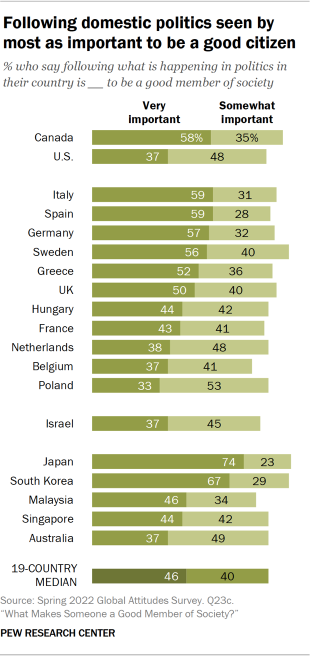
At least three-quarters of adults in every country surveyed say that following politics in their country is important to be a good member of society. In seven nations, majorities say that keeping up with domestic politics is a very important trait of good members of society. This view is especially common in Japan and South Korea.
In 15 of the 19 countries included in this year’s survey, supporters of the governing party or coalition place more value on political awareness than nonsupporters. Take Hungary as an example: 50% of Fidesz supporters say that following what is happening in Hungarian politics is very important to be a good member of society, compared with 39% of those who do not support the governing party.
In some countries, age plays a role, too. In the U.S., Canada, Germany, the UK, Australia and Singapore, those ages 50 and older are more likely to say following politics is very important to be a good member of society than respondents ages 18 to 29. The opposite is true in South Korea.
There are also several instances of gender differences: In South Korea, Canada, Italy, Sweden and the UK, women are more likely than men to say following politics is very important. Polish and Israeli men more commonly say that political awareness is a very important part of being a good member of society.
Majorities say following international news is important, though to a lesser degree than domestic politics
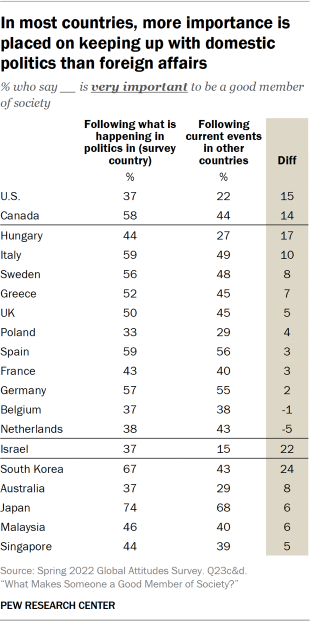
Like following domestic politics, majorities in each country surveyed say following current events in other countries is an important part of being a good member of society. However, fewer say keeping up with foreign affairs is very important than say the same about following domestic politics in nearly all countries surveyed. And in the U.S. and Israel, fewer than a quarter say that following current events in other countries is very important for being a good member of society.
Partisan preferences play a significant role in some countries on whether people consider following current events in other countries as very important. In the U.S., Canada, Belgium, Greece, Spain, Israel, Malaysia and South Korea, supporters of the governing party are more likely to have this opinion.
While there is no variation between liberals and conservatives in the U.S. when it comes to the importance of following domestic politics, the left is significantly more likely to say keeping up with foreign affairs is very important to be a good member of society. The same pattern is visible in Germany, Israel and Poland among those on the ideological left and right.
In six places – Canada, Greece, Italy, Spain, Australia and South Korea – women are more likely than men to say an awareness of international events is very important to be a good member of society.
Publics are somewhat divided over how important it is to join demonstrations in order to be a good member of society
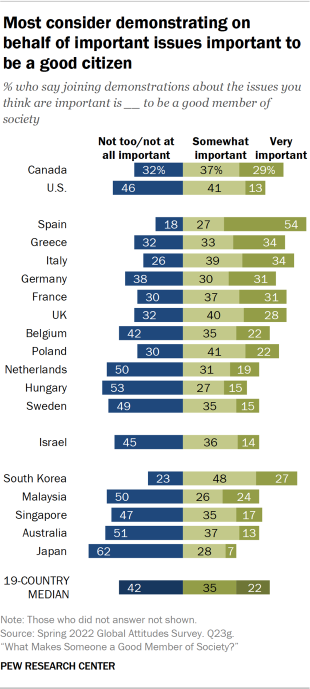
Most publics think joining demonstrations about the issues people think are important is part of being a good member of society. Still, there is more disagreement on this issue than many of the others tested on the survey. A median of around half say it is at least somewhat important (57%), while around four-in-ten or more in many countries surveyed say it is not too or not at all important. And, only in Spain does more than half of the public say it’s very important to join demonstrations in order to be a positive member of society. Elsewhere, the share who holds this position ranges from about a third in Greece, Italy, Germany and France to around one-in-ten who say the same in Japan, Australia and the U.S.
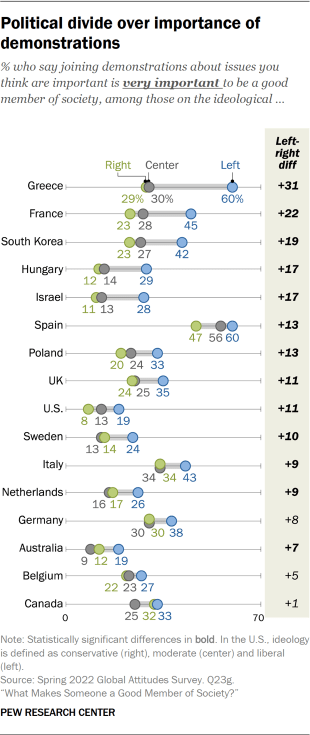
Ideological differences on this question are fairly large, with those who identify on the left of the political spectrum being much more likely to say demonstrations are very important than those on the right. For example, in Greece, 60% of those on the left say demonstrations are very important, relative to 30% of those in the center and 29% of those on the right.
In a few countries, younger people are also more likely to see demonstrations as very important than older ones. In Canada, for example, adults under age 30 (41%) are about twice as likely as those 50 and older (22%) to believe demonstrating is very important.
Most say attending religious services is not imperative for being a good citizen
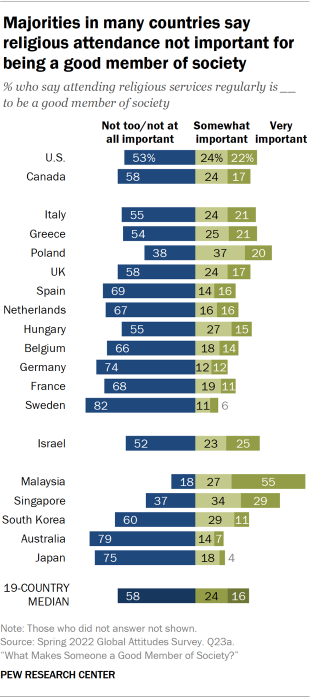
A minority in most of the advanced economies surveyed describe attending religious services as something that’s important for being a good member of society. Only in Malaysia, Singapore and Poland does a majority take the view that religious attendance is at least somewhat important. And, even across these three countries, the share describing it as very important varies widely, from 55% who say this in Malaysia to fewer than a third who say the same in Singapore (29%) and Poland (20%).
In fact, in most countries, fewer than a quarter say it’s very important to attend services to be a good member of society – and in Australia (7%), Sweden (6%) and Japan (4%), fewer than one-in-ten hold this view.
Generally speaking, places where religion is seen as more important overall to people’s lives are also places where attendance is seen as crucial for being a good member of society (correlation of 0.97). And places where people think it is necessary to believe in God to be moral are also places where attending religious services regularly is seen as very important for being a good member of society (correlation of 0.81).
Views also vary across religious groups within societies. In South Korea, for example, Christians (23%) are more likely to say it’s very important to attend religious services than Buddhists (9%). In Singapore, Muslims (54%) prioritize attendance more than Christians (46%) or Buddhists (19%). The same general pattern is found in Malaysia, between Muslims (62%), Christians (56%) and Buddhists (26%).
In Israel, Muslims also emphasize religious attendance (37%) more than Jews (23%). But, within the Israeli Jewish community, divisions are extreme: 78% of Haredim and Datiim (the “ultra-Orthodox” and the “religious”) think it’s very important to attend religious services regularly to be a good member of society, while fewer than one-in-ten Masortim (“traditional”) or Hilonim (“secular”) agree.
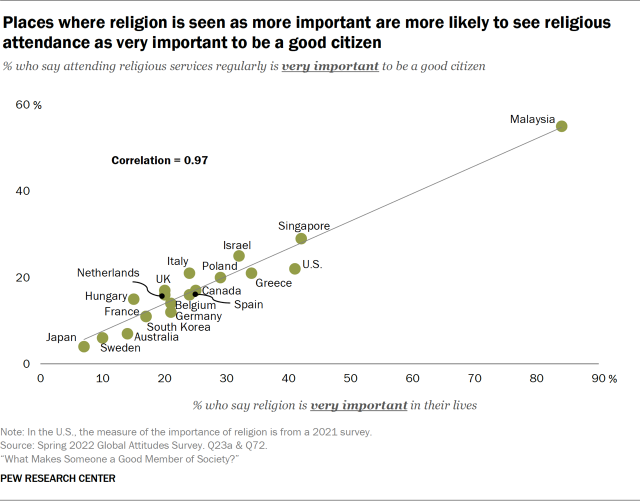
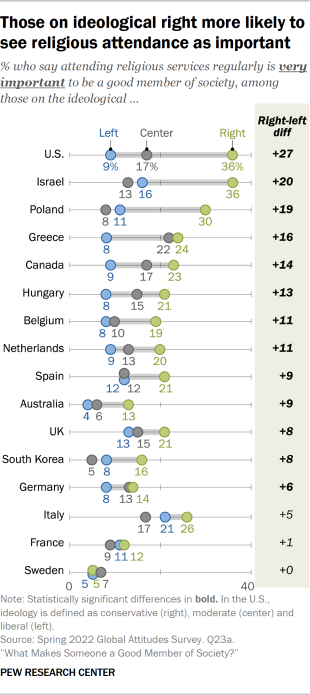
In the U.S., Canada, the Netherlands, the UK and Australia, Protestants tend to say going to services is very important to be a good member of society more than Catholics – though both groups emphasize it more than the unaffiliated members in each society. In the U.S., Protestants further differ based on race and whether they identify as evangelicals, with White evangelicals (49%) being more likely to say attendance is very important than either non-evangelical Whites (17%) or Black Protestants (36%) (similarly detailed religious classifications were not included in most other countries).
Ideology plays a role, as well: Those on the ideological right tend to be much more likely to describe attendance as crucial to be a good citizen than those on the ideological left. In Israel, for example, 36% of those who place themselves on the right say it’s very important to attend religious services regularly, compared with 13% of those in the center and 16% of those on the left. In most countries, people with a favorable view of right-wing populist parties are also more likely to say it’s very important to attend religious services regularly than those who do not see those parties in a favorable light.
Older people – who also tend to be more religious in most countries – see religious attendance as more important for being a good member of society than younger ones in seven of the countries surveyed. And, in around half of the countries surveyed, those with lower levels of education are more likely to say it’s crucial to attend services than those with higher levels of formal education.




